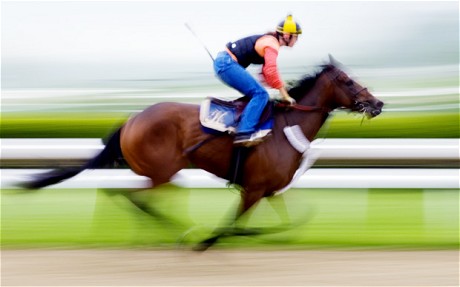
经过长途飞行去其他国家参赛的赛马实际上会跑的更快,科学家们在观察了这种奇怪的现象后宣称了这一发现。
和人不一样,马能很快从跨时区效果中恢复过来。这是因为马的身体对光的变化非常敏感,而与24小时循环的关系并不强。
当进行长途的旅行时,尤其是朝东的旅行,会使人昏昏欲睡、行动缓慢并导致睡眠混乱。但是马却能在经历一段长时间的黑夜,紧接着是白天后快速的调整自己。
这种长途迁徙甚至会产生一种正面的影响,因为这激发了能提高动物运动表现的激素。这个发现发表在《Journal of Neuroendocrinology》上。
布里斯托尔大学的研究人员对7匹赛马进行了为期3个月的训练,然后将它们置于人为的光照环境,以模拟朝向东方、跨越7个时区的飞行状态。
研究人员报道说,尽管这些动物的压力水平保持正常,但是它们的身体在24小时内就调整适应了新的昼夜循环,这种昼夜的变化导致了一种叫做催乳激素的激素水平升高,这种激素在那些对体力消耗很严重的器官中起作用。
他们发现,与经过长途迁徙前的表现相比,这些马以全速在跑步机上奔跑的时间要长25秒。不过这种效果在两个星期后就消失了。
主持了这项研究的Domingo Tortonese说:“如果要将一匹马进行跨子午线空运,那越接近比赛越好。”
尽管这项研究中的马没有经过实际的飞行劳顿,但是Tortonese博士说,在与驯马师交流中得知,他们自己也偶然地发现了这一现象。
他说,当一些训练师以为马和我们有同样的生物钟而在比赛前早早地飞到目的地时,其他在比赛前最后关头才飞到的训练师却发现他们的马变得更厉害了。
一项后续的研究发现,在朝西飞行时,马能够获得同样的好处,Tortonese博士说,不过只有保持在赤道上才能得到提升。
他解释说,由于马的季节感很强,所以如果将它们转移至一个不同季节的地方,那就会适得其反。(生物探索译)
相关英文论文摘要:
Experimental Jetlag Disrupts Circadian Clock Genes but Improves Performance in Racehorses after Light Dependent Rapid Resetting of Neuroendocrine Systems and the Rest-Activity Cycle
Abrupt alterations in the 24-h light:dark cycle, such as those resulting from transmeridian air travel, disrupt circadian biological rhythms in humans with detrimental consequences on cognitive and physical performance. In the current study, a jetlag-simulated phase shift in photoperiod temporally impaired circadian peaks of peripheral clock gene expression in racehorses, but acutely enhanced athletic performance without causing stress. Indices of aerobic and anaerobic capacities were significantly increased by a phase-advance, enabling prolonged physical activity before fatigue occurred. This was accompanied by rapid re-entrainment of the molecular clockwork and the circadian pattern of melatonin, with no disturbance of the adrenal cortical axis, but a timely rise in prolactin, a hormone known to target organs critical for physical performance. Subsequent studies showed that, unlike the circadian pattern of melatonin, and contrary to other species, the daily rhythm of locomotor activity was completely eliminated under constant darkness, but it was restored immediately upon the reintroduction of a light:dark cycle. Resetting of the rhythm of locomotion was remarkably fast, revealing a rapid mechanism of adaptation and a species dependency on light exposure for the expression of daily diurnal activity. These results show that horses are exquisitely sensitive to sudden changes in photoperiod and that, unlike humans, can benefit from them; this appears to arise from powerful effects of light underlying a fast and advantageous process of adjustment to the phase shift.
英文论文链接:https://www.biodiscover.com/news/bioneuro/library/1943







